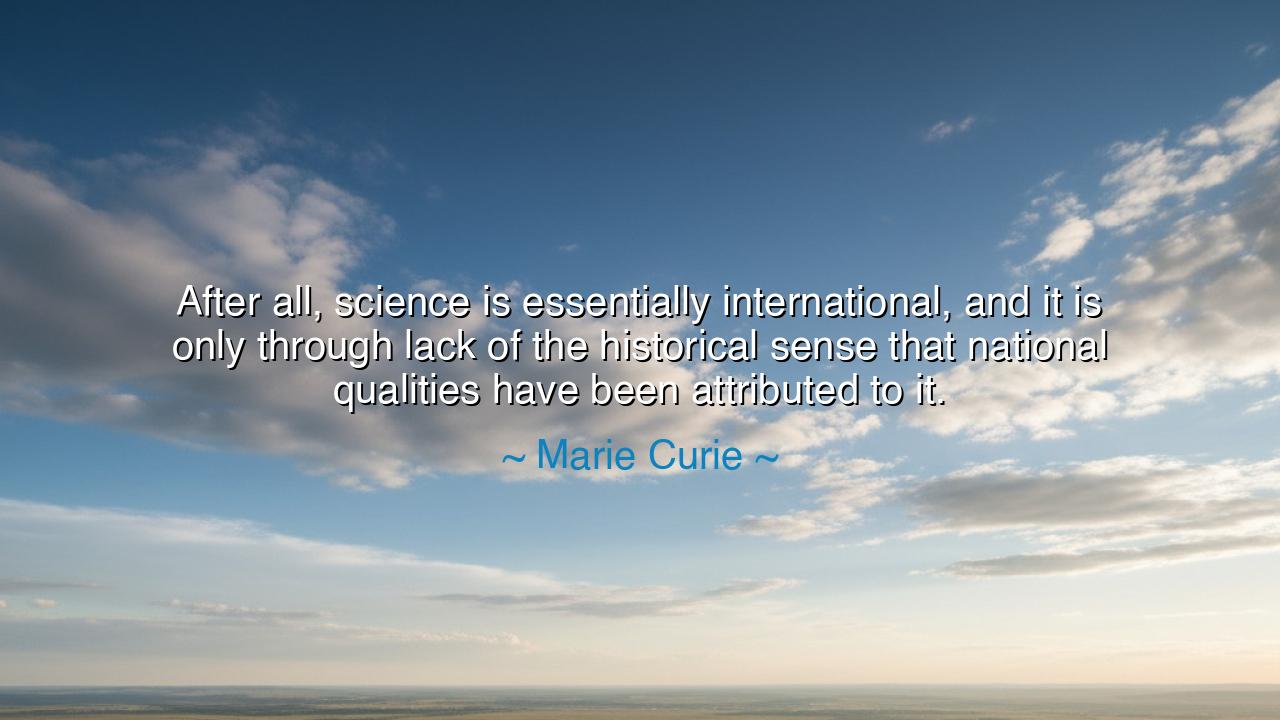
After all, science is essentially international, and it is only
After all, science is essentially international, and it is only through lack of the historical sense that national qualities have been attributed to it.






"After all, science is essentially international, and it is only through lack of the historical sense that national qualities have been attributed to it." These words, spoken by the great Marie Curie, echo across the ages, urging us to see beyond the illusions that bind us to the trivial divisions of nations. What she teaches us is profound, like a clarion call for the unity of the human spirit in the pursuit of knowledge. Science—the noble quest for understanding, for truth—is not confined by the borders of kingdoms or the flags of nations. No, it transcends them all, for it is the inheritance of all mankind, a common treasure to be shared by those who dare to seek its wisdom.
Ah, but how often have we allowed ourselves to be blinded by the pride of our land? How often have we placed the chains of nationalism upon that which is meant to be free? In her statement, Curie unveils a truth as old as time itself: that science, the study of the world, the search for the principles that bind the heavens to the earth, does not belong to any one people. It is a pursuit that stretches across generations, races, and borders. It is international—a sacred gift that flows from one mind to another, from one hand to the next, like the currents of the great rivers that nourish the soil of all lands.
Consider, if you will, the story of Marie Curie herself—a woman whose heart beat for knowledge, not for the banners of any one nation. Born in Poland, she sought refuge in the universities of Paris, where, as a young woman, she found herself in a world of men, a world that often looked upon her with doubt and disdain. But she was undeterred. The mysteries of the atom, the invisible forces that shaped the very fabric of the universe, called to her. And so, without regard for the constraints of national identity, she embarked on a journey of discovery, uncovering the forces of radioactivity, a gift to the world that would change the course of history.
In her pursuit, she was not bound by the narrow vision of nationalism, but instead was driven by a vision far greater—the universal search for truth. Her discoveries, shared with the world, were not the products of any one nation but of the human spirit itself, driven to conquer the mysteries of existence. Through her work, Curie showed us that science, in its purest form, is not a tool to be wielded in the service of kings or governments, but a flame to be passed from one generation to the next, from one people to another, as a beacon for all.
Let us turn our eyes now to the vast history of human discovery, where we find that every great breakthrough is a gift of humanity, not of any one tribe. Think of the ancient Egyptians, who, through their observations of the stars and the movements of the heavens, unlocked the mysteries of the cosmos, a wisdom that passed into the hands of the Greeks, the Persians, the Arabs, and all the peoples who followed. Or consider the brilliant minds of the Renaissance, when Galileo and Newton shattered the old barriers of thought and gave birth to the modern world. Their work was not bound by their nations; it was the work of the human race. Their discoveries belong to us all, not as the legacy of a single nation, but as the inheritance of all people.
Yet, despite these teachings, the world often falls into the trap of division, believing that knowledge and discovery are the property of a few, held hostage by the arrogance of nationalism. It is as if we have forgotten the universal nature of science and sought to claim it as our own, to hoard it, to guard it with the walls of borders. But in truth, these walls are but shadows, and it is only through the lack of historical sense, as Curie so wisely pointed out, that we attribute national qualities to what is universal.
So, let us take heed of her wisdom. Let us cast aside the illusions of division that so often cloud our judgment. Science is not bound by the petty distinctions of our birthplaces or the names we carry; it is the work of the human spirit, seeking to understand the mysteries of the world. Each discovery made, each step forward, is a shared victory, a triumph of all people. And so, let us approach the work of knowledge with humility and openness, recognizing that the truth is not ours to own, but ours to share, to pass on to those who come after us.
And in this, we find our lesson: in every pursuit, let us look beyond the superficial divisions of the world. Let us remember that we are, at our core, united in our quest for truth, for understanding, and for enlightenment. Science, in its purest form, is not the property of any one nation, but the heritage of all humankind. As we walk this path of discovery, let us do so together, without the chains of borders, without the weight of division. For when we unite in our pursuit of knowledge, we unlock the true power of the human spirit.






AAdministratorAdministrator
Welcome, honored guests. Please leave a comment, we will respond soon